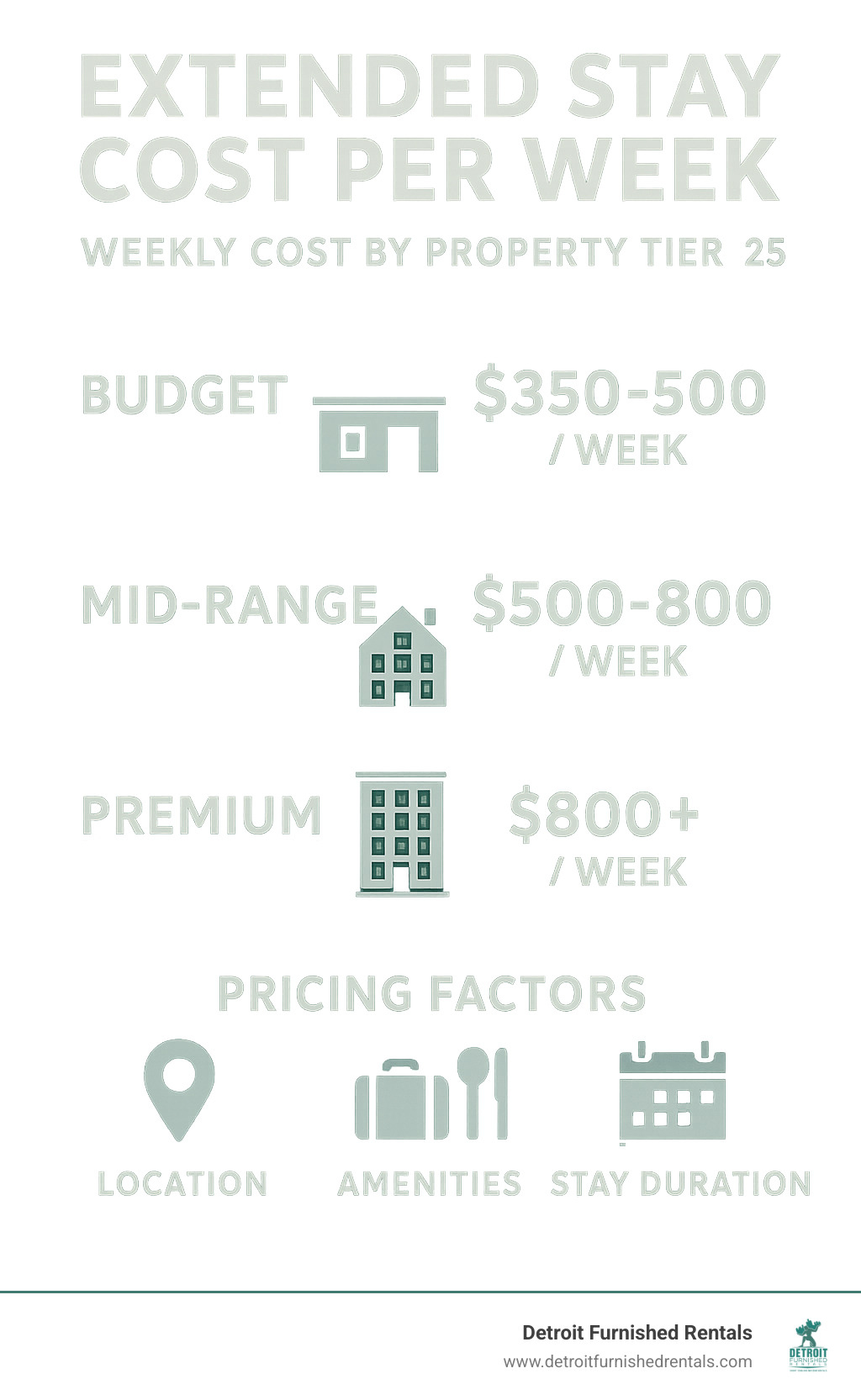Why Understanding Extended Stay Costs Matters for Your Budget
Extended stay cost per week varies dramatically based on location, amenities, and stay duration, but you can expect to pay anywhere from $350-$1,200 weekly depending on your needs:
Quick Cost Overview:
- Budget Extended Stays: $350-$500 per week ($50-$71/night)
- Mid-Range Properties: $500-$800 per week ($71-$114/night)
- Premium Suites: $800-$1,200+ per week ($114-$171+/night)
- Long-term Savings: Up to 45% off for 30+ day stays
Whether you’re a traveling nurse on assignment, a corporate professional relocating, or someone between homes, understanding these costs upfront helps you budget effectively and avoid surprises.
The research shows significant price variations – from Reddit users reporting $50/night at budget-friendly locations in the Southeast to premium properties charging $450+ weekly. Location makes a huge difference, with properties near major cities like Boston commanding $76/night while similar accommodations in smaller markets cost $50/night.
Why weekly rates matter: Most extended stay properties offer automatic discounts for 7+ night bookings, with some budget-focused brands advertising average savings of 34% per night on weekly rates compared to daily bookings.
I’m Sean Swain, founder of Detroit Furnished Rentals, and I’ve spent years helping corporate travelers and healthcare professionals steer extended stay cost per week options while managing furnished rental properties in Detroit. My experience in both the hospitality industry and short-term rental management gives me unique insight into what drives these costs and how to find the best value.

Understanding the Average Extended Stay Cost Per Week
Let’s get real about what you’ll actually pay for an extended stay cost per week. These aren’t your typical hotel rooms – they’re designed for folks who need a place to call home for more than just a few nights, and the pricing reflects that longer commitment.
The weekly rates vary quite a bit depending on what level of comfort and amenities you’re looking for. Think of it like choosing between a basic sedan, a mid-size SUV, or a luxury car – they’ll all get you where you need to go, but the experience (and price) differs significantly.
Economy tier properties focus on getting you the essentials without breaking your budget. These places prioritize value over fancy features, and you’ll often find them in neighborhoods that aren’t right in the heart of downtown. The trade-off? You might pay around $350 per week – that’s what one traveler reported paying at a property in Tallahassee, Florida, at about $50 per night.
Mid-scale tier options hit that sweet spot between affordability and comfort. These properties feel more like home, with better amenities and often more convenient locations. You’re looking at roughly $420-$455 per week in many markets. A guest in the Southeast reported paying $60-65 per night, which works out perfectly in this range.
Upscale residential-style suites are for when you want to feel like you’re living in a nice apartment rather than staying in a hotel. These properties offer larger spaces, premium finishes, and extensive amenities. While the exact weekly costs vary widely by location, expect to pay significantly more for this level of comfort.
Location makes a huge difference in pricing. That same level of accommodation that costs $50 per night in northern Illinois might run you $76 per night near Boston – that’s jumping from $350 to over $530 per week for similar amenities.
What’s a Realistic Extended Stay Cost Per Week?
Here’s what you can realistically expect to pay for your extended stay cost per week, broken down by budget level:
Budget-friendly range ($350-$500 per week) works perfectly if you’re focused on saving money. These properties might be a bit older or located further from city centers, but they cover all the basics. Solo travelers, contractors, and anyone prioritizing their budget over luxury will find great value here. That traveler paying around $50 per night outside Baltimore falls right into this sweet spot.
Mid-range average ($500-$800 per week) is where most people find their comfort zone. You get solid amenities, decent locations, and that important balance between cost and convenience. The properties are well-maintained, offer home-like features, and you won’t feel like you’re roughing it. This range gives you the best bang for your buck when you factor in things like having a kitchenette and on-site laundry.
Premium options ($800+ per week) are for when you need extra space, high-end finishes, or special services. Maybe you want daily breakfast included, or you need a two-bedroom suite for your family. These properties are often newer, in prime locations, and designed to feel more like a luxury apartment than a hotel room.
The price variation really comes down to location. A property in a major city will almost always cost more than a similar one in a smaller town or suburban area. It’s just the reality of real estate – location, location, location.
How Included Amenities Affect the Price
The amenities included in your rate make a huge difference in both the extended stay cost per week and the overall value you’re getting. This is where extended stays really shine compared to regular hotels or even some apartment rentals.
Fully equipped kitchens are absolute game-changers for longer stays. Being able to cook your own meals saves serious money on food costs, which add up fast over a week or more. We’re talking full-size refrigerators (perfect for storing that leftover pizza!), stovetops, microwaves, and even dishes and cookware. This amenity alone can justify paying a bit more per week.
On-site laundry facilities mean you don’t have to hunt down a laundromat or spend extra money washing your clothes elsewhere. Many properties offer complimentary machines, which is incredibly convenient when you’re staying for weeks at a time.
Free Wi-Fi is pretty much standard everywhere these days, but it’s still worth mentioning. You won’t have to worry about data overages or setting up temporary internet service.
Fitness centers make it easy to stay active when you’re living on the road. Having a 24/7 gym just steps away from your room is pretty convenient.
Complimentary breakfast isn’t available everywhere, but when it is, it can save you a good chunk of change on morning meals. Some places even offer light evening snacks and social hours a few days a week, which helps with both dinner costs and meeting other long-term guests.
Pet-friendly options are crucial if you’re traveling with your furry family members. While there are usually fees involved – sometimes $25 per pet per night plus cleaning fees – the convenience of not having to find pet-sitting arrangements is invaluable.
All these amenities work together to transform a simple hotel room into a genuine “home away from home,” making the overall value of your extended stay cost per week much stronger.
Key Factors That Influence Your Weekly Rate
Beyond the tier of the property, several dynamic factors constantly influence your extended stay cost per week. Understanding these can help us anticipate prices and make smarter booking decisions.

Location is absolutely the biggest game-changer when it comes to your weekly rate. The difference between a major metropolitan area and a smaller city can be eye-opening – we’re talking about paying $76 per night outside Boston versus just $50 per night in northern Illinois or Tallahassee, Florida. That’s a difference of over $180 per week for essentially the same type of accommodation!
Even within the same city, your neighborhood choice matters tremendously. A downtown property near the business district will almost always cost more than one on the outskirts. Properties near major hospitals, corporate campuses, universities, or popular tourist attractions tend to command premium rates because demand stays consistently high.
Seasonality plays a sneaky but significant role in your extended stay cost per week. Just like traditional hotels, extended stay properties ride the waves of supply and demand throughout the year. During peak seasons – think holidays, major local events, or prime tourist times – you’ll see rates climb. Florida properties, for example, become notably more expensive during winter months when folks escape the cold.
The flip side? Off-season travel can lead to substantial savings. If your dates are flexible, this is your golden opportunity to secure a much better rate.
Room type directly impacts what you’ll pay each week. Studios are typically your most budget-friendly option, offering an open-concept living and sleeping area that works perfectly for solo travelers. Step up to a one-bedroom suite, and you’ll get that separate living room space – ideal for longer stays where you need to spread out a bit. Two-bedroom suites offer the most space and privacy, often with multiple bathrooms, making them perfect for families or colleagues traveling together.
Some rooms come with special features like larger kitchens, dedicated workspaces, or great views, which can bump up the price slightly but might be worth it for your comfort and productivity.
Brand tier also influences pricing, though we won’t get into specific brand comparisons. What matters is understanding that different hotel companies target different demographics and price points. Budget-focused brands emphasize value and essential amenities, while mid-to-upscale options offer more extensive services and amenities that justify their higher weekly rates.
The Impact of Your Stay’s Duration
Here’s where the magic happens – the longer you commit to staying, the more money you’ll save. This is the heart of the extended stay model, and understanding it can dramatically reduce your extended stay cost per week.
Seven nights is your minimum for accessing weekly rates at most properties. This baseline commitment can save you an average of 34% compared to daily rates. It’s like getting two nights free when you book a full week!
Thirty-day stays open up serious savings – we’re talking about potential savings of 45% or more compared to daily rates. Monthly rates can average around $800 and up depending on the property and location, which works out to roughly $200 per week. That’s a dramatic difference from daily booking rates.
Sixty-plus day commitments often qualify for even deeper discounts through special programs designed for extended travelers. Some guests who book for around 90 days report paying just $60-65 per night, showcasing how powerful these long-term commitments can be.
The pricing typically follows a tiered model: daily rates are highest, weekly rates offer good savings, monthly rates provide substantial discounts, and some properties have special rates for stays over 60 or 90 days.
For really long stays extending several months, direct negotiation with property managers often yields the best results. They have more flexibility for long-term guests and understand the value of reducing turnover costs. When planning a long-term relocation, you’ll also want to handle logistics like setting up USPS Mail Forwarding to your temporary address.
How Taxes and Fees Affect Your Final Extended Stay Cost Per Week
Nobody likes surprise costs, but taxes and fees can significantly impact your final extended stay cost per week if you don’t plan for them upfront.
Hotel occupancy tax is the most common additional cost you’ll encounter. This percentage gets added to your nightly rate and varies by city and state – some places are quite reasonable while others can really sting.
Here’s a money-saving secret: stays over 30 consecutive days may qualify for tax exemptions in many areas. After 30 days, you might be considered a “tenant” rather than a transient guest, which can exempt you from hotel occupancy taxes. This exemption can lead to substantial savings, so always ask the property directly about their policy and local regulations.
If you’re traveling with pets, pet fees are unavoidable but predictable. Expect to pay around $25 per pet per night, plus potentially a one-time cleaning fee. Always clarify these costs upfront so there are no surprises.
Incidental deposits are standard practice – typically around $100 that gets refunded after check-out assuming no damage occurs. Think of it as insurance for the property.
Cleaning fees might apply in certain situations, especially for pet stays or if extra cleaning is required beyond normal housekeeping services.
The key is asking for a complete breakdown of all costs, including taxes and fees, before you book. A little upfront clarity saves a lot of checkout frustration!
Furnished Rentals vs. Traditional Apartments: A Cost & Convenience Breakdown
When you’re weighing your options for temporary housing, the choice often comes down to extended stay hotels versus furnished rentals. Both solve the same problem, but their extended stay cost per week and convenience factors tell very different stories.
Having managed furnished rentals in Detroit for years, I’ve seen how the right choice can save both money and headaches. Let me break down the real differences between these options.
The flexibility factor is where furnished rentals truly shine. While traditional apartments lock you into year-long leases with hefty penalties for early termination, furnished rentals work with your timeline. Need to stay three months for a work project? No problem. Suddenly have to extend another month? We’ve got you covered.
Credit checks and approval processes create another stark contrast. Traditional apartments often require excellent credit scores, employment verification, and references that can take weeks to process. Furnished rentals typically have streamlined approval processes focused more on your ability to pay rather than your credit history.
Here’s where the numbers get interesting:
| Feature | Furnished Rentals | Traditional Apartments |
|---|---|---|
| Lease Terms | Flexible (weekly to monthly) | Typically 12+ months |
| Credit Check | Simplified process | Extensive screening required |
| Utilities | All-inclusive pricing | Separate bills for gas, electric, internet, cable |
| Furnishings | Fully equipped and ready | Empty – requires furniture purchase/rental |
| Move-in Costs | Often just first payment + deposit | First month, last month, security deposit, utility deposits |
The all-inclusive pricing model of furnished rentals eliminates the surprise bills that come with traditional apartments. Your extended stay cost per week includes everything – utilities, internet, furniture, even kitchen supplies. With traditional apartments, you’re looking at additional monthly costs for electricity, gas, internet, cable, and furniture rental or purchase.
Move-in costs tell another compelling story. Traditional apartments often require first month’s rent, last month’s rent, security deposits, and utility connection fees that can total $3,000-$5,000 upfront. Furnished rentals typically require just your first payment and a refundable security deposit.
The convenience factor extends beyond just money. Furnished rentals come with everything from coffee makers to bed linens. Traditional apartments leave you starting from scratch – buying everything from a can opener to curtains. For professionals on temporary assignments or people in transition, this convenience is invaluable.
Pet policies also differ significantly. While traditional apartments often have strict breed restrictions and hefty pet deposits, many furnished rental providers (like us at Detroit Furnished Rentals) build pet-friendly options into their standard offerings.
The no long-term commitment aspect cannot be overstated. Life changes, work assignments end, and flexibility becomes crucial. Furnished rentals adapt to your needs rather than forcing you to adapt to their rigid terms.
For stays under six months, furnished rentals almost always provide better value when you factor in the hidden costs and convenience benefits. The extended stay cost per week might seem higher at first glance, but when you add up furniture, utilities, setup time, and flexibility, the math usually favors the furnished option.




